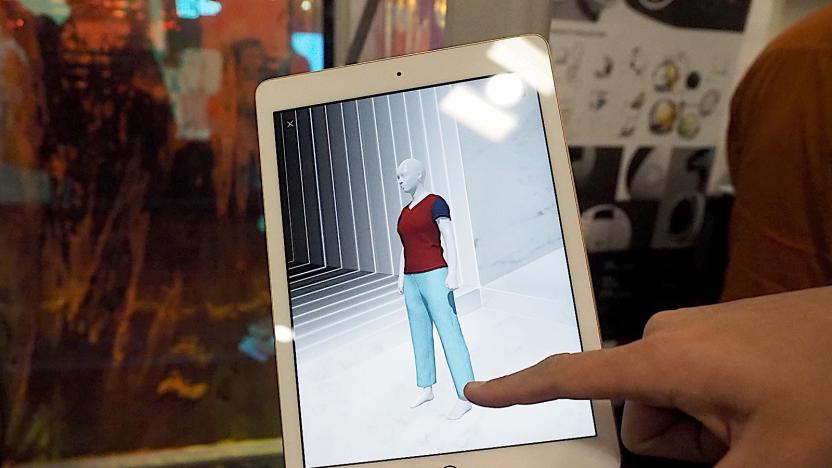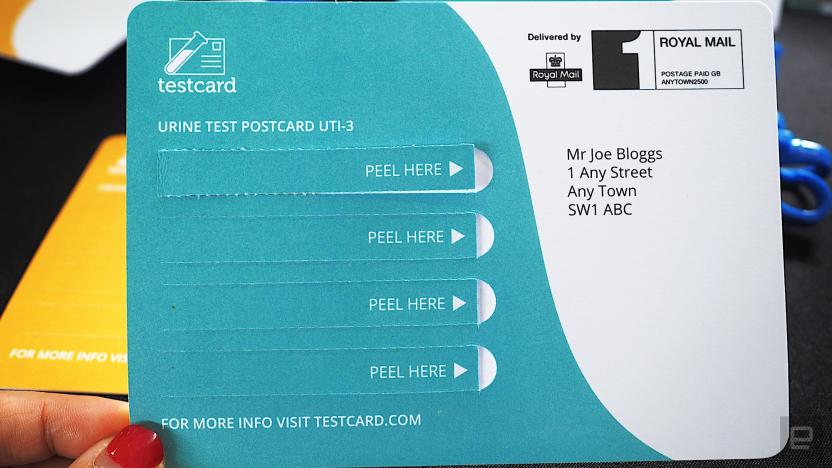tcdisrupt
Latest

3D body scanner promises perfectly fitting clothes
Last year, we had a look at TG3D Studio's Scanatic 360 Body Scanner, which susses out your body's measurements so you know exactly what clothing size to get at the store. Now, the company has renamed it to the VTO (Virtual Try-On) by Scanatic for Fashion, and has upgraded it so it can capture higher density scans, making them much more accurate than before. This way, you can "see" just how the clothes will fit on your body, hopefully making it that much easier to get the right outfit for your body type.

Lockheed's drone challenge: create an AI pilot that beats pro racers
While autonomous drones exist, they're not usually what you'd call speedy when many skilled pilots could beat them in a race. Lockheed Martin and the Drone Racing League want to do better. They're launching an AlphaPilot Innovation Challenge that will encourage the public to develop drone AI that can not only race at high speeds, but win. Competitors will have to build an NVIDIA Jetson-based AI system that can swiftly move through the League's Artificial Intelligence Robot Racing circuit.

Lilu is a pumping bra that promises more breast milk in less time
Breast pump technology have come a long way from the awkward manual tools of old. Now there are smart pumps that can pump out milk as nursing mothers carry on with their everyday lives; one even won our Best of CES award this year for its simple unobtrusive design. Yet, most breast pumps only do one thing: suction. Some doctors and lactation experts also advise to massage the breasts, pressing all around to get the milk out, which can be a tedious task. Lilu, however, is one company that aims to fix this. It's made what it calls the first-ever pumping bra with automated compression, that applies the pressure for you.

Pee on a postcard to determine if you have a UTI
Among the many startups on display at the TechCrunch Disrupt hall in San Francisco this week are companies focused on health and biotech. The products ranged from smart exercise bikes to breast pumps that look like they're from a science-fiction film. One of them, however, stood out from the rest with a large sign that simply read "Take the piss," with the last word in big bold letters. The company is called Testcard, and it claims to tell if you have a urinary tract infection if you pee on the postcard. It's just one of many medtech startups vying for legitimacy in an increasingly crowded field.

Pi can wirelessly charge your phone from a short distance
Despite Apple finally releasing phones with wireless charging, the technology has actually been around for several years. And the fact is, charging via a pad is still kind of a pain -- you can't really use them when they're being charged and you either need a charging pad for every device or one ginormous pad for all of your devices. There have been other companies that promise long-range wireless power before -- Energous' WattUp says it can charge devices up to 15 feet away -- but these products have yet to come to market. A new startup called Pi, however, aims to offer a wireless charging solution that is somewhere in between.

Viv, from Siri's creators, is the virtual assistant of your dreams
Siri made the world aware of the potential of virtual assistants, but several years after its release, it's still a bit basic. Siri can only do certain very specific tasks, and she doesn't play well with third-party services. So for its next product, Viv, the people behind Siri aimed to build a much more capable virtual assistant. And at this point, it looks like it's succeeded, judging from a brief demonstration today at TechCrunch Disrupt in New York City.

Eric Migicovsky on Pebble's origin, smartwatch philosophy and what's wrong with the competition
Pebble is an unequivocal success story thus far -- setting Kickstarter funding records and making its way to retail outlets. However, the road it's taken hasn't been been all smooth, and at TechCrunch Disrupt today, company CEO Eric Migicovsky spoke about Pebble's beginnings and some of the challenges it faced as a hardware startup. Migicovsky said that he first started working on Pebble's precursor five years ago, not because he thought it would become a business but because "it was something I wanted to have," he said. That first prototype was essentially a hacked Arduino strapped to his wrist, and while it "didn't work too well as a watch" due to poor battery life and performance, he got a lot of positive feedback from other folks who saw it. Those folks geeking out over that prototype is what convinced him to enter the smartwach business.

GoPro CEO Nicholas Woodman on building a Google Glass-style wearable: don't count on it
Unless you've been living under a rock for the past couple years, odds are you've seen one of Nicholas Woodman's little cube cameras strapped to someone's chest or stuck to a car. Today at TechCrunch Disrupt 2013, the GoPro CEO was asked if he'd be interested in moving beyond the cube and mount form factor and into something more svelte, Glass-like, even. While he found value in Google Glass' ability to shoot first-person video, Woodman isn't so keen on such a device due to its limited use case (it can really only be worn on your face). "The Google Glass form factor doesn't provide the versatility that has been so key to GoPro's success," he said, before going on to extol the virtues of having a camera that can be mounted on your chest, your car or pretty much anywhere. Essentially, he sees the fact that GoPro can provide any point of view for video as a key selling point for his cameras. Instead, Woodman sees Glass (or other such wearables) as an excellent way for folks to interact with GoPro cameras. He pointed out the camera line's functionality with current smartphones -- using a handset as a remote control, or previewing and sharing footage, noting that wearables could provide similar features, only in hands-free fashion. So, we won't see any new GoPro models meant solely for wearing, but you can bet we'll be seeing a GoPro Glass app at some point.

Monsieur robotic bartender automates mixed drinks with a tap of a finger
While many of us enjoy the pleasure of mixed alcoholic beverages, not everyone wants to take the time to make them ourselves. Perhaps that's why the Raspberry Pi-powered Bartendro cocktail mixing bot proved so popular that it easily reached its $135,000 Kickstarter goal. Yet, the Bartendro's decidedly homespun look might not fly so well in more respectable establishments. Enter the Monsieur, which is a much more elegant solution for lazy lushes everywhere. Monsieur is a "robotic bartender" housed inside a stylish black box, developed by Georgia Tech mates Barry Givens and Eric Williams after Givens got tired of waiting for a mixed drink at a bar. The duo spent months working to make sure it poured just the right measurements per drink (that must've been fun to test) and making other refinements that resulted in the machine you see above. The Monsieur comes in either eight or 12 bottle configurations, and you can find out which alcohol or mixer to put in which slot by following the instructions on the machine. It has a built-in recipe library, customizable drink profiles and it even creates a grocery list for you. Right now the machine uses an Android tablet to drive it, but they hope to have a more integrated solution when it comes to market. There's also a corresponding mobile app that offers recipe ideas. The Monsieur is currently being marketed as part of bottle service at high-end bars and at sporting events. All the staff would need to do is roll the box into a room and let customers order what they want; the computer will keep track of the orders and bill them when they're done. Givens and Williams don't rule out the possibility of a consumer version, but that's not in the cards just yet. Until then, check out the source link for more info or hit up the via to see their presentation at TechCrunch Disrupt.

Cota by Ossia hopes to charge your phone wirelessly, no contact required
We've all heard of wireless charging before, but most solutions still require your phone to come in touch with a base station. Well, Cota is a technology that aims to power your mobile device completely wirelessly -- without any physical contact at all. Hatem Zeine, a physicist and CEO of Ossia Inc, demonstrated the technology on stage at TechCrunch Disrupt when he successfully charged his iPhone when plugged with a Cota prototype, seen above, while holding it several feet away from a charging station. It all seems like voodoo, but the secret lies in sending a magnetic charge over the same 2.4GHz spectrum that WiFi and Bluetooth already use. If you're concerned about safety, Zeine assures us that only one watt of power is transmitted -- that's a third of what cell phones already transmit. Line of sight isn't required, and Zeine claims that one station can power multiple devices at once. Just like a WiFi hotspot, you can set it so that it only works with certain devices or simply open it up so that power is available to all Cota-enabled handsets within range, which is around 30 feet.

Standout iOS apps from TechCrunch Disrupt
TechCrunch Disrupt is all about startups, and one of the hottest areas of innovation is mobile apps. Not surprisingly, there were quite a few companies showcasing new and exciting titles on the conference floor. Thanks to the footwork of our own Mike Rose and Doc Rock at Disrupt, we were able to hand-pick several standout iOS apps that were on display. Keep an eye on these companies below -- they may be small now, but they could be the next Instapaper. Mapp2link Mapp2link combines location awareness with messaging to help you connect with nearby LinkedIn contacts. It's similar to Sonar, but focused exclusively on professional connections and simplicity. The app uses push notifications so you'll always know when a contact is in your vicinity. Mapp2link is available for free in the iOS App Store. Yopine Yopine is a group-mind polling app that lets you ask for opinions and get input from friends before you make an important (or trivial) decision. For example, rather than getting into a long email thread about where to eat or which ski resort to visit, Yopine lets you gather all the "votes" in one place and let everyone know what the final plan is. You can check out the free Yopine app in the iOS App Store. Quoter Quoter is the Instagram for your platitudes. The app places your favorite quotes into striking templates and allows you to share them with your friends and family. Quoter is available for free in the iOS App Store. Tweekaboo Tweekaboo is a private social network that lets you create a digital family scrapbook and share those precious moments with your close family members. The company plans to roll out a book printing option in the next few weeks. Tweekaboo is available for free from the iOS App Store. SaveTheMom Save The Mom takes all your family's communications and compiles them into one app so everyone (in the family) can see your lists, appointments, photos and more. Save The Mom is available for free from the iOS App Store. Purchext Purchext is an expense reporting tool for a child's allowance. It helps parents track their children's spending by requiring them to submit a receipt and get approval for a purchase. Money for the purchase is pulled from funds placed on a securely borrowed credit card. You can learn more about the service on Purchext's website and from this TechCrunch Disrupt article. Park Tag Park Tag wants to make parking easier by connecting a person who is vacating a parking spot with someone who is in the same vicinity looking for a space to park their car. It's an ambitious use of social networking. The Park Tag app is available for free from the iOS App Store. We'll have more coverage of some of our favorite featured products from TC Disrupt (including Crowdfynd and Skit!) in the next couple of days.




